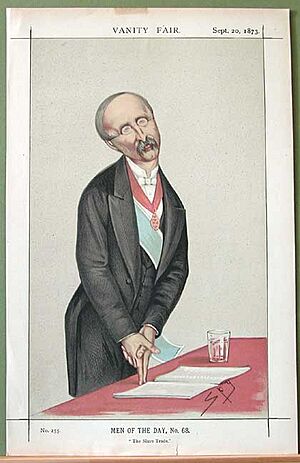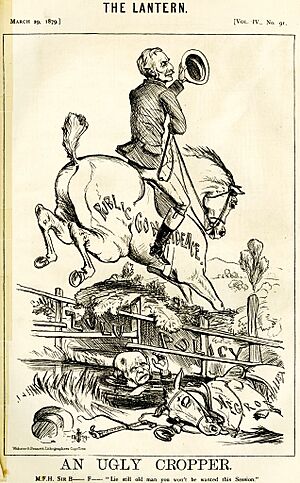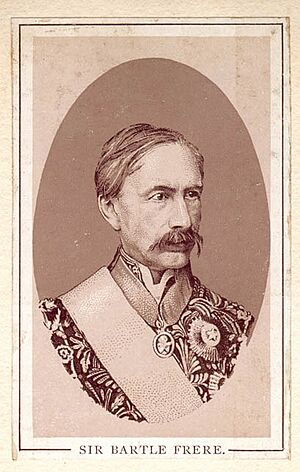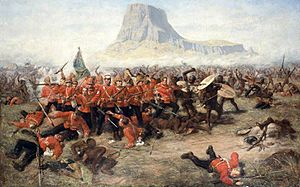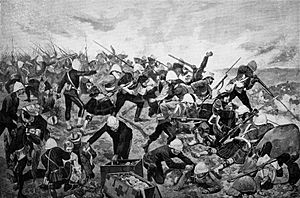Henry Bartle Frere facts for kids
Quick facts for kids
Sir Henry Bartle Frere
|
|
|---|---|
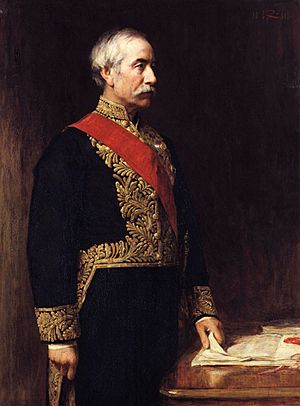 |
|
| Commissioner of Sind | |
| In office 1851–1859 |
|
| Monarch | Victoria |
| Preceded by | Richard Keith Pringle |
| Succeeded by | Jonathan Duncan Inverarity |
| Governor of Bombay | |
| In office 1862–1867 |
|
| Monarch | Victoria |
| Preceded by | Sir George Russell Clerk |
| Succeeded by | William Vesey-FitzGerald |
| High Commissioner for Southern Africa | |
| In office 1877–1880 |
|
| Monarch | Victoria |
| Preceded by | Sir Henry Barkly |
| Succeeded by | Henry Hugh Clifford acting |
| Personal details | |
| Born | 29 March 1815 Clydach, Monmouthshire, Wales |
| Died | 29 May 1884 (aged 69) Wimbledon, London, England |
| Citizenship | British |
| Alma mater | East India Company College |
Sir Henry Bartle Edward Frere, 1st Baronet (born March 29, 1815 – died May 29, 1884) was a Welsh British official who worked in different parts of the British Empire. He had a very successful career in India, where he became the Governor of Bombay (1862–1867).
However, his time as High Commissioner for Southern Africa (1877–1880) was controversial. He tried to unite the region under British rule, which led to conflicts like the Anglo-Zulu War (1879) and the First Boer War (1880–1881). Because of these problems, the British Prime Minister, Gladstone, called Frere back to London. He was officially criticized for acting carelessly.
Contents
Early Life and Education
Henry Bartle Frere was born at Clydach House in Clydach, Monmouthshire, Wales. His father, Edward Frere, managed the Clydach Ironworks. Henry was one of several children. His older sister was Mary Anne Frere, and his younger sister was Frances Anne Frere. He was also related to other important people in his family.
He went to school at the East India Company College. This college trained people for jobs in India, which was then under British rule.
Family Life
On October 10, 1844, Henry Bartle Frere married Catherine Arthur. She was the daughter of Sir George Arthur, 1st Baronet, who was the Governor of Bombay. Frere had been Sir George Arthur's private secretary two years before their marriage.
They had five children together:
- Mary Eliza Isabella Frere (born 1845)
- Catherine Frances Frere (born 1849), who later edited a famous cookbook
- Georgina Hamilton Chichester Frere (born around 1850)
- Bartle Compton Arthur Frere (born around 1855)
- Eliza Frederica Jane Frere (born around 1857)
Career in India
After finishing college, Frere started working for the British government in Bombay (now Mumbai) in 1834. He quickly moved up in his career. In 1835, he became an assistant collector in Poona (now Pune). By 1842, he was chosen to be the private secretary to the Governor of Bombay, Sir George Arthur.
Two years later, he became a political resident at the court of Raja Shahji of Satara. After the Raja's death in 1848, Frere managed the province.
Commissioner in Sindh
In 1850, Frere was made the chief commissioner of Sindh. He made important changes there. In 1851, he improved the postal system in Sindh. He based it on the British postal service, making it more affordable and efficient. This system later became the foundation for India's entire postal service.
During the Indian Mutiny in 1857, Frere sent troops to help secure important areas like Multan and the Punjab. His efforts were recognized, and he received thanks from the British Parliament. He was also made a Knight Commander of the Order of the Bath (KCB).
As chief commissioner, Frere also made the Sindhi language compulsory in Sindh in 1851. Before this, Persian was used. He ordered officials to learn Sindhi to do their daily work better. A committee decided to use a modified Persio-Arabic script for Sindhi. Frere also helped publish many Sindhi books, which encouraged local writers.
Governor of Bombay
In 1859, Frere became a member of the Viceroy's Executive Council. Then, in 1862, he was appointed Governor of Bombay. As governor, he continued to improve the city. He helped establish the Deccan College in Pune and a college for Indian students to study civil engineering.
A 5-mile road in Kirkee Cantonment was named after him around 1865. He also ordered the old Fort walls to be taken down. This allowed the city to expand and grow. The famous Flora Fountain was built in his honor. During his time as governor, his daughter, Mary Frere, collected Indian folk tales. These were published in a book called Old Deccan Days (1868).
In 1867, Frere returned to England. He received more honors, including the GCSI. He also received honorary degrees from Oxford and Cambridge universities. He became a member of the Council of India.
Career in Africa
In 1872, the British government sent Frere to Zanzibar. His mission was to negotiate a treaty with the sultan, Barghash bin Said, to stop the slave trade. This was a successful mission.
In 1873, he became a member of the Privy Council. In 1875, he traveled with the Prince of Wales to Egypt and India. His work was so impressive that Lord Beaconsfield, the Prime Minister, offered him a special honor. Frere chose to become a baronet, but Queen Victoria gave him both honors.
High Commissioner for Southern Africa
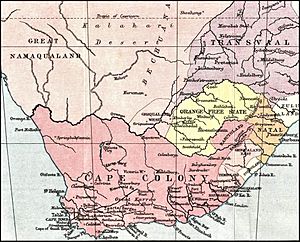
In 1877, Frere was made High Commissioner for Southern Africa. This was a very important role. The British government wanted to unite the different states of southern Africa into a British Confederation. Frere accepted the job, with a higher salary. He understood that if he succeeded, he would become the first British Governor-General of a united southern Africa.
Attempt to Unite Southern Africa
The idea of uniting the states of southern Africa under British control was not new. It was seen as a way to bring the region together and prevent conflicts. However, an earlier plan for a federation had been rejected in 1858 because it wasn't practical.
Lord Carnarvon, the British Colonial Secretary, wanted Frere to try the confederation plan again. But many local groups in southern Africa did not support this idea. They felt that Britain was trying to force this plan on them without understanding their local conditions. The Prime Minister of the Cape Colony, John Charles Molteno, warned that confederation would lead to instability and resentment. He believed a full union would be better, but only later when the region was more stable.
At this time, the different states in southern Africa were still cautious after recent British expansion. The Afrikaners, for example, did not support confederation. They later rebelled in the First Boer War. Many Black South African states were also suspicious of British expansion. Frere's policies, along with his local ally John Gordon Sprigg, caused a series of wars across Southern Africa. These included the Anglo-Zulu War and the Boer Wars.
Resistance from the Cape and the Xhosa
The local government of the Cape Colony, led by John Charles Molteno, was initially welcoming to Frere. The Cape Colony was the largest and most powerful state in the region.
However, Frere soon faced strong opposition to the confederation plan. The Cape government preferred to let neighboring Boer and Black African states manage their own affairs. They also had more liberal policies at home. They worried that uniting with less liberal Boer republics would harm the rights of the Cape's Black citizens. The Cape government also believed that Carnarvon's plan would lead to conflicts between the British Empire and independent states like Zululand and the Transvaal. Molteno's main message was that confederation ideas should come from the local communities, not be forced upon them from outside.
The region was also suffering from a severe drought, which often made tensions worse. In September 1877, a small conflict broke out between the Mfengu and Gcaleka tribes on the Cape frontier. The Cape government saw it as a local police matter. But Frere immediately went to the frontier and declared war on the independent state of Gcalekaland. Frere saw this as a chance to take over Gcalekaland for the planned confederation. He also worried that independent African states could pose a threat to "white civilization." This led to the 9th Frontier War.
The Transkei Xhosa were defeated in early 1878. Frere then gained authority from the British government to remove the Cape's elected government. He asked his ally, John Gordon Sprigg, to form a new government. This move helped Frere overcome constitutional obstacles in the Cape. However, it was overshadowed by growing conflicts across Southern Africa and Lord Carnarvon's resignation.
Outbreak of Zulu and Boer Wars
The Zulu Kingdom under King Cetshwayo was still independent. Frere believed that for confederation to work, Cetshwayo's forces had to be defeated and Zululand taken over. While Carnarvon was Colonial Secretary, this idea had support. However, his replacement, Sir Michael Hicks-Beach, wanted to avoid war in southern Africa. Frere used the slow mail between London and Cape Town to send his letters in a way that bypassed the Colonial Office's opposition to war. In December 1878, Frere sent Cetshwayo an impossible ultimatum, which effectively declared war.
Cetshwayo could not meet Frere's demands, even if he wanted to. Frere ordered Lord Chelmsford to invade Zululand, starting the Anglo-Zulu War. On January 11, 1879, British troops crossed the Tugela River. Fourteen days later, the British suffered a terrible defeat at the Battle of Isandlwana. This led the House of Commons to demand Frere's recall. However, Prime Minister Beaconsfield supported him. Frere was criticized but allowed to stay. He had greatly underestimated the Zulus, whom he had called "a bunch of savages armed with sticks."
The problems with the Zulus and growing unhappiness in the Transvaal made things worse. The delay in giving the Transvaal a new government fueled anger among the Boers. The defeat at Isandlwana also damaged Britain's reputation. Frere could not fully focus on the Transvaal until April 1879. He visited a camp of about 4,000 unhappy Boers near Pretoria. Despite the difficult situation, Frere earned the Boers' respect by promising to take their complaints to the British government. He also promised to push for the promises made to them to be kept. The Boers eventually left the camp.
However, Frere's achievements were overshadowed. First, by the death of Napoleon Eugene, Prince Imperial in Zululand on June 1, 1879. Then, by the news that control of the Transvaal and Natal had been taken from him and given to Sir Garnet Wolseley. Meanwhile, the Boers' anger at Frere's policies exploded in December 1880, leading to the disastrous First Boer War. British defeats in this war, including at Majuba Hill, led to the Boer Republics regaining their independence. This also ended Carnarvon's confederation plan.
Outbreak of the Basotho Gun War
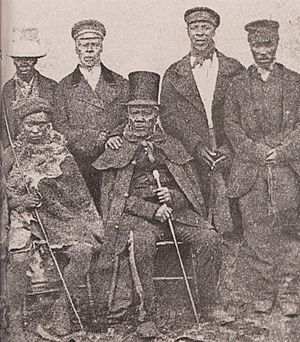
Basutoland, the home of the Basotho people, had been under the Cape Colony's control since 1872. However, the Cape government had allowed the Basotho leaders to keep much of their traditional power. The Basotho were also well-equipped with firearms because they were allies and trading partners with the Cape.
Frere pushed for "The Peace Protection Act" (1879) during the Xhosa Wars. This act ordered all people of African descent to give up their weapons. The Basuto Gun War (1880) followed, as the Basotho rebelled against what they saw as an unfair and racist rule. Premier John Gordon Sprigg's attempt to disarm the Basotho was made worse by his plan to set aside Basotho land for white settlers.
The war resulted in British defeats, like at Qalabani. It ended in 1881 with a treaty that favored the Basotho. This rebellion is a key reason why Lesotho is now an independent country and not part of South Africa. At the same time as the Basuto Gun War, unrest also flared up again among the Xhosa in the Transkei.
Recall from Africa
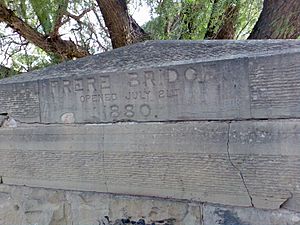
In 1880, Frere was called back to London to face accusations of misconduct. When Gladstone's government took office in 1880, they initially did not plan to recall Frere. However, in June, some members of the Liberal party asked Gladstone to remove him. The prime minister agreed on August 1, 1880.
The disaster at Isandlwana and the humiliating defeats of the First Boer War contributed to his recall. He was replaced by Sir Garnet Wolseley. Frere was then accused of acting recklessly and was criticized by the British government.
Later Life and Death
Upon his return to England, Frere responded to the accusations about his actions in Afghanistan and South Africa. He was preparing a more complete defense when he died in Wimbledon on May 29, 1884. He was buried in St Paul's Cathedral in London.
Memorials and Legacy
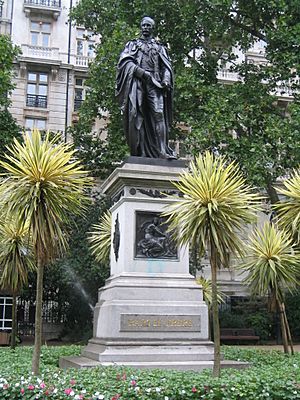
Frere was the founder and first president of the Royal Society of South Africa in 1877.
Many places and things were named in his honor:
- Frere Hall in Karachi, Pakistan, was built for him. The city also named a road, street, and town after him.
- Karachi Grammar School's Frere House is named after him.
- In 1888, a statue of Frere was unveiled on the Thames embankment in London.
- Mount Bartle Frere (1622m), the highest mountain in Queensland, Australia, is named after him.
- A boarding house at Haileybury, his old school, is named after him.
- A road in Parktown, Johannesburg, South Africa, is named Frere Road.
- In Durban, South Africa, two roads honor him: Frere Road and Bartle Road.
- Freretown, a district in Mombasa, Kenya, is named after him.
- Mount Frere (now known as KwaBhaca) in the Eastern Cape, South Africa, was named after him in the 19th century.
The botanist N. A. Dalzell (1864) named the plant genus Frerea after H. B. Frere. It has only one species, Frerea indica Dalzell. Dalzell said he named it after Frere to show respect and because Frere always supported scientific research in India.
In Popular Culture
Sir John Mills played Bartle Frere in the movie Zulu Dawn. His portrayal in the film shows him in a negative light.
See also
- Horniman Circle Gardens
- Mount Frere
 | Frances Mary Albrier |
 | Whitney Young |
 | Muhammad Ali |


